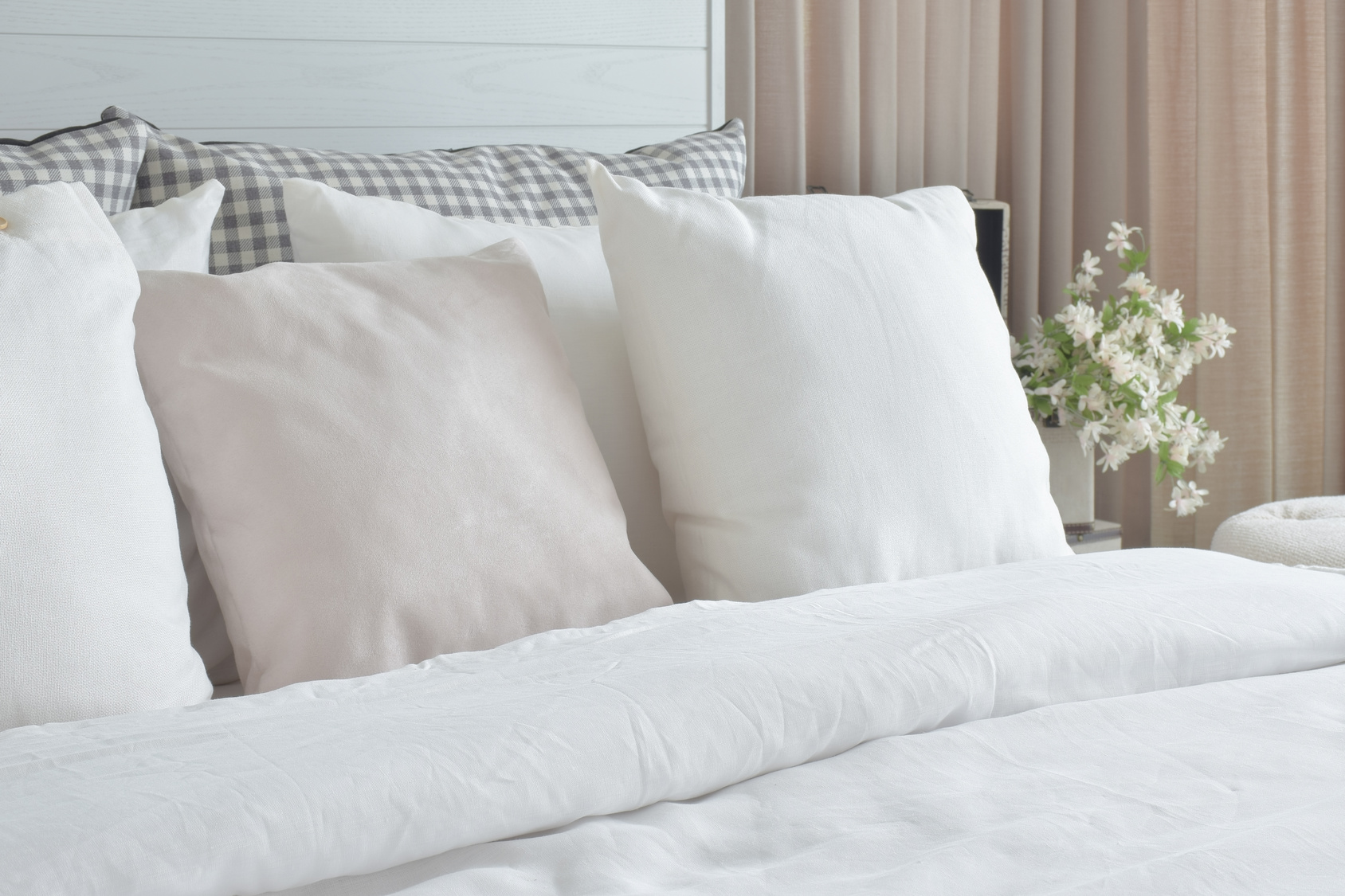The aim of Feng Shui is the most simple of all : sleep better, live better, work better. Lack of sleep weakens the immune system as well as the ability to concentrate during daytime and makes us more prone to depression, anxiety and low mood.
We spend a third of our lifetime sleeping, so it stands to reason we should do everything possible to ensure a restful sleep. The following tips will encourage a better night’s sleep so that you feel energized and positive at the start of each new day.
Make your bedroom a peaceful place
Your bedroom should be a sanctuary. Keep it devoid of clutter, open the windows at least ten minutes each day to allow fresh air to flow through, and regularly change the bedding – preferably in cotton or washed linen – to keep it crisp, fresh and inviting.
Opt for soft lighting and try not to have screens in the room (TVs, tablets, laptops and phones) as using these before bedtime makes it difficult to sleep.
Before going to bed, you can also burn 2 or 3 drops of Ylang Ylang Essential Oil in a diffuser ; it will promote relaxation and a restorative sleep.
Clear your mind before sleep
One of the most common factors of sleep deprivation is worry.
It is important to clear your mind of negative thoughts before you go to bed. There are numbers of way to do this, such as writing down what’s on your mind or compiling a to-do list for the next day ; you can also express gratitude by thinking of three good things that happened to you during the day, which is a great way to banish negative thoughts and go to bed with a positive frame of mind.
Find the right place for your bed…
You may have heard that you should sleep with your head positioned toward the north.
Actually, the direction you should sleep is determined by your ming gua based on your date of birth, but even though you don’t know your ming gua, you can find the ideal position for your bed : it should be placed on an unobstructed wall, diagonally across from the door and far enough away from the window so that the flow of Qi does not disrupt your sleep.
The bed should also be accessible from both sides, but for a single bed such as a child’s one, it can be placed against the wall.
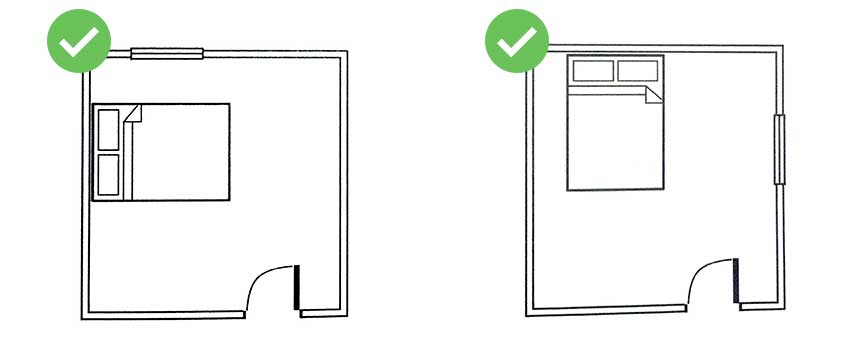
The bed should be placed on an unobstructed wall, diagonally across from the door and far enough away from the window so that the flow of Qi does not disrupt your sleep.
…and avoid the bad ones
Placing your bed under a window does not promote quality sleep : as Qi flows into your bedroom from the door to the window, you would then sleep in the middle of a “wind tunnel” that causes disturbance. For the same reason, you should avoid placing your bed between the door and the window.
As feeling secure is a Feng Shui basic for a good sleep, your bed should be supported by a wall and therefore not placed on an angle or in the middle of the room, without any solid support. Finally, you should avoid sleeping under ceiling beams because of the sensation of danger they create.
Add a splash of colour
There is no specific colour to use or avoid in a bedroom ; it most depends on your taste regarding interior design and overall on the Feng Shui evaluation of your bedroom that would give guidelines on which of the five elements (water ; wood ; fire ; earth ; metal) to display and the corresponding colour scheme.
And remember, shiny colours are proven to make you feel more positive and happy so add splashes of colour to brighten up your mornings!
What if you’re still not sleeping well ?
If you’ve done everything you could and applied every piece of advice above to improve your bedroom environment and that you are still facing sleep problems, then a Feng Shui evaluation of the energies in your bedroom might be a good option. Once you will have made the changes recommended, in just a few days , you will start sleeping peacefully and restfully again, really worth a try!

When I’m talking about Feng Shui, there’s always a point in the conversation where I’m asked : “So, what about mirrors?” Well, nothing actually ;-)! In classical Feng Shui, there is no rule or constraint regarding the use of mirrors, and they have never been used as a remedy. The belief that mirrors can ward off evil omens, absorb, deflect, or stimulate Qi’s movement is wishful thinking. Mirrors only reflect light hitting its glass surface.
So, where does the misconception about mirrors come from? As described in the excellent book “The complete idiot’s guide to Feng Shui” from Elizabeth Moran, Master Joseph Yu and Master Val Biktashev (Alpha), the precursor to the modern Lo Pan compass was called a Shi Pan. Made of a round “heaven” disc that swivels on a square “earth” base plate, the Shi Pan was inscribed with various images of the cosmos, including one of the Big Dipper. Interestingly, the inscribed Dipper is a mirror opposite from its true configuration in the heavens ; this is because the Shi Pan “mirrors” the perfect and ideal world.
In the Han dynasty (206 B.C.E – 220 C.E), mirrors were made of polished bronze, also illustrating the model world. Both the bronze mirrors and Shi Pan were considered magical because they reflected an absolute balance between heaven and earth. They were even buried in tombs to help the deceased into the next world.
A little bit of history never hurts, does it? And anyway, the truth is that you can display mirrors wherever you’d like in classical Feng Shui, absolutely no limit!
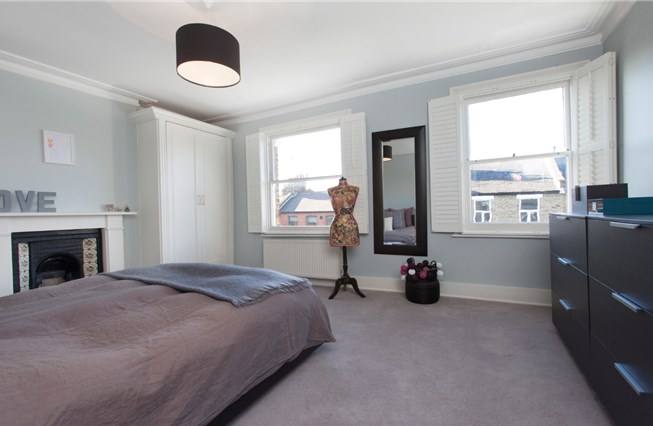
A Master Bedroom Feng Shui project in London
The Yang energy dominating in this master bedroom as it benefits from the incoming sunlight needs to be balanced with Yin energy, favourable to rest and relaxation : the chests of drawers, the bed and the mirror are in wenge wood and most accessories are dark coloured (blanket, bed cover, cushions, ceiling light).
FENG SHUI PROJECT MAKEOVER IN LONDON
Before – Home office : The desk benefits from the incoming sunlight as it is under the window, but sitting at that desk, your back is facing the doorway, making you feeling insecure. Moreover, Qi flows directly toward you (from the door to the window), causing a lack of concentration.
After – Living Room : Mainly Yang (bright colors and natural light), balanced with a bit of Yin, for warmth and cosiness : dark colors, carpet, cushions and blankets.
Feng Shui project makeover in London
Before – Living Room : The armchairs standing in the Qi path between the door and the window do not promote rest and relaxation. Moreover, as they are very large and massive, they do not allow Qi to flow freely all over the room.
After – Home Office : The desk is near the window to benefit from the natural light, and facing the room : sitting at the desk, your back is supported by the wall behind and you can see anyone who enters : this is the key to concentration and productivity.
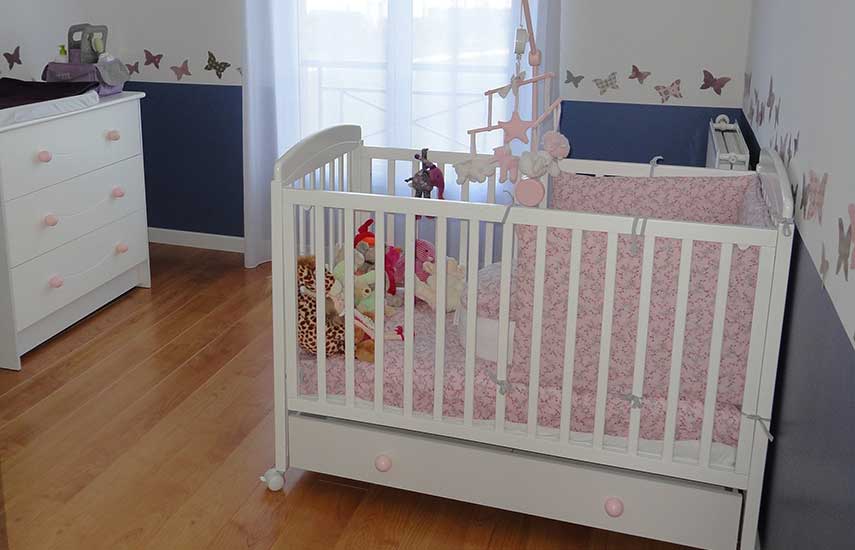
A Feng Shui nursery project in Paris
This is a white and blue baby bedroom, which colours are corresponding to Metal and Water Feng Shui elements.
The bed is placed on an unobstructed wall diagonally across from the door and far enough away from the window in order to avoid the incoming Qi that might disrupt the sleep.
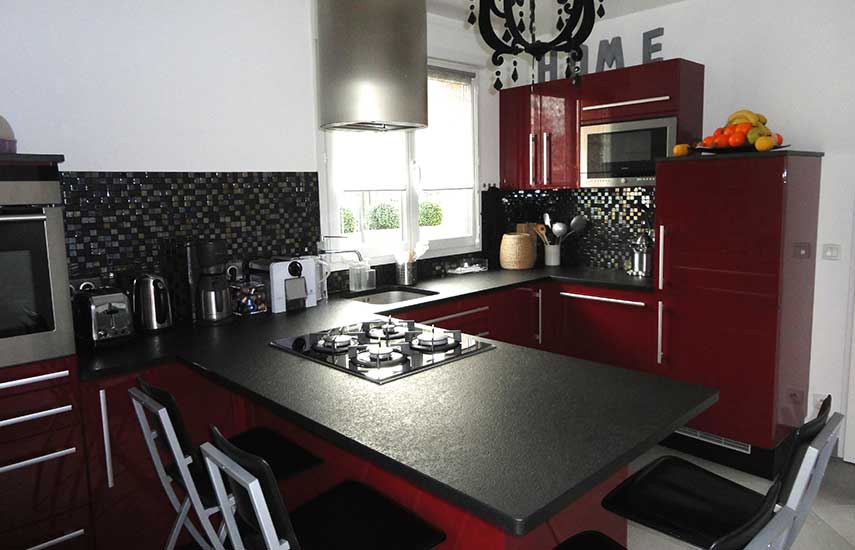
Red lacquer kitchen (Fire element) ; the worktop is in black granite and the floor is covered with concrete slabs (Earth element).
In addition, two of my children, sharing the same room, had serious difficulty to fall asleep at night while my second daughter, who was in another room, was sleeping easily.
As Feng Shui is a subject that has always interested me, I spoke to Geneviève who suggested me to make a complete Feng Shui diagnosis of our duplex to improve the situation.
What I appreciated in the approach of Geneviève is first her availability. Indeed, she visited three times our place : first for an overview of the existing situation, to study the configuration of the rooms, the position of the furniture and to determine the direction of our duplex with traditional Chinese compass, Lo Pan – pretty impressive! – ; a second visit to provide me with the actual diagnosis with all Feng Shui solutions ; and finally a last visit a few weeks later to review the changes that I made to my apartment following the second visit.
Moreover, I loved her way to build the relationship – very attentive, very empathetic – which helped me to clarify my needs and refine my expectations.
I was also very sensitive to the quality of the finished product that Geneviève gave me during her second visit : in addition to a very comprehensive and well presented document detailing all Feng Shui Solutions, Geneviève helped me to see the right colours using a colour chart. I enjoyed a lot the practical side of the recommendations, therefore easy for me to implement – either immediately (change the position of furniture, for example) or with a minimal decoration investment. I also want to emphasize flexibility in the Feng Shui solutions that Geneviève suggested me : for example, she had planned three options for allocating rooms among family members ; she explained to me the advantages and disadvantages of each of them so that I could choose knowingly .
Finally, what has definitely convinced me is the relevance of the analysis of Geneviève and the efficiency of the Feng Shui improvements implemented : today, I feel so much better at home. Actually, I simply feel “at home”. For example, I have radically transformed my living room and my study room – where I could not “relax” before – in cozy and welcoming spaces where I now spend long moments to read or work with pleasure.
My three kids love their new respective bedrooms and their sleeping problems have disappeared.
Finally, with regard to my family, Feng Shui has kept its promises of balance and harmony!”
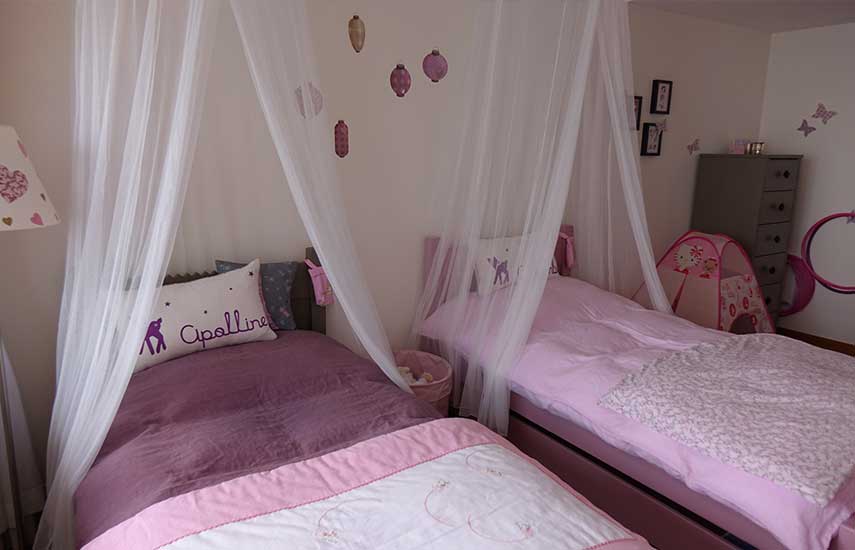
A little girls’ bedroom in Hong Kong, with Fire colors dominating (pinks and purples).
The beds are placed on the wall diagonally across from the door and far enough away from the window in order to avoid the incoming Qi that might disrupt the sleep.
As feeling protected is the key to a restful sleep, tulle canopies have been placed around both beds.


